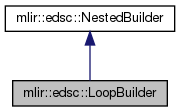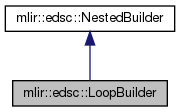#include <Builders.h>


Public Member Functions | |
| LoopBuilder (const LoopBuilder &)=delete | |
| LoopBuilder (LoopBuilder &&)=default | |
| LoopBuilder & | operator= (const LoopBuilder &)=delete |
| LoopBuilder & | operator= (LoopBuilder &&)=default |
| void | operator() (function_ref< void(void)> fun=nullptr) |
Static Public Member Functions | |
| static LoopBuilder | makeAffine (ValueHandle *iv, ArrayRef< ValueHandle > lbHandles, ArrayRef< ValueHandle > ubHandles, int64_t step) |
| static LoopBuilder | makeLoop (ValueHandle *iv, ValueHandle lbHandle, ValueHandle ubHandle, ValueHandle stepHandle) |
Additional Inherited Members | |
 Protected Member Functions inherited from mlir::edsc::NestedBuilder Protected Member Functions inherited from mlir::edsc::NestedBuilder | |
| NestedBuilder ()=default | |
| NestedBuilder (const NestedBuilder &)=delete | |
| NestedBuilder (NestedBuilder &&other) | |
| NestedBuilder & | operator= (const NestedBuilder &)=delete |
| NestedBuilder & | operator= (NestedBuilder &&other) |
| void | enter (mlir::Block *block, int prev=0) |
| void | exit () |
| ~NestedBuilder () | |
Detailed Description
A LoopBuilder is a generic NestedBuilder for loop-like MLIR operations. More specifically it is meant to be used as a temporary object for representing any nested MLIR construct that is "related to" an mlir::Value (for now an induction variable). This is extensible and will evolve in the future as MLIR evolves, hence the name LoopBuilder (as opposed to say ForBuilder or AffineForBuilder).
Constructor & Destructor Documentation
◆ LoopBuilder() [1/2]
|
delete |
◆ LoopBuilder() [2/2]
|
default |
Member Function Documentation
◆ makeAffine()
|
static |
Constructs a new AffineForOp and captures the associated induction variable. A ValueHandle pointer is passed as the first argument and is the only way to capture the loop induction variable.
◆ makeLoop()
|
static |
Constructs a new loop::ForOp and captures the associated induction variable. A ValueHandle pointer is passed as the first argument and is the only way to capture the loop induction variable.
◆ operator()()
| void mlir::edsc::LoopBuilder::operator() | ( | function_ref< void(void)> | fun = nullptr | ) |
The only purpose of this operator is to serve as a sequence point so that the evaluation of fun (which build IR snippets in a scoped fashion) is scoped within a LoopBuilder.
The particular use case concerns nested blocks:
◆ operator=() [1/2]
|
delete |
◆ operator=() [2/2]
|
default |
The documentation for this class was generated from the following files:
- include/mlir/EDSC/Builders.h
- lib/EDSC/Builders.cpp
 1.8.13
1.8.13